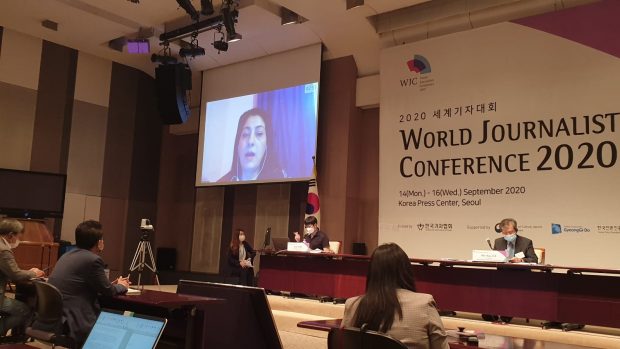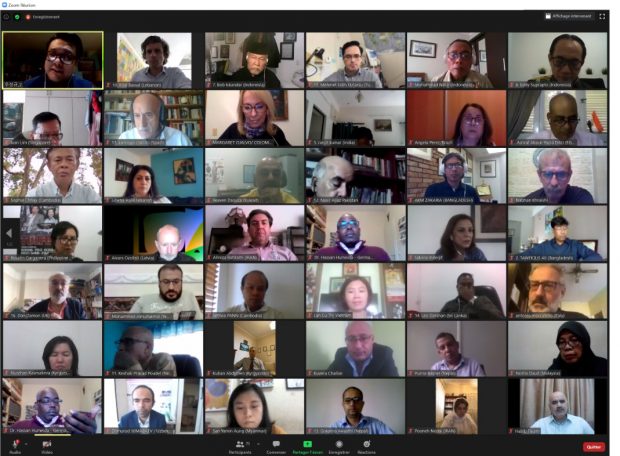
Fake news and the future of journalism: The case of Lebanon

By Ghena Halik
Laha Magazine & Asia N – Lebanon
BEIRUT: Participating in the World Journalists Conference (WJC) 2020 was an opportunity to listen to reports by senior South Korean officials and seasoned journalists about three themes – Fake news and the future of journalism, global responses to COVID-19 and the 70th anniversary of the Korean War and peace policy in the Korean Peninsula.
The conference, in its eighth edition, was organized by the Journalists Association of Korea virtually due to the heavy restrictions imposed by the spread of the coronavirus worldwide.
With more than 10,000 journalists from 188 media companies as members, the Journalists Association of Korea, established in 1964, is the nation’s biggest association of journalists.
In my participation, I focused on how Lebanon has been dealing with the dangerous spread of fake news.
This is my participation:
“Thank you for this opportunity to share with you the view from Lebanon about fake news.
Unfortunately, Lebanon is in the news these days mainly for the disaster that hit our beloved Beirut and the terrible loss of innocent lives and the damaging consequences.
However, be assured that the strong resolve of the Lebanese people will once more prevail, especially that great support from friends like you presents great motivation for the people and the media to keep moving forward.
We in Lebanon, like all countries across the world, have been challenged by the incredible spread of fake news with all the dangers they carry.
As you know, fake news are a global phenomenon that accompanies revolutions and political, social, health and even artistic events.
It can be a rumour launched by some people to distort truth or to spread confusion in order to mislead society. It may sometimes be launched by a party concerned with the news for propaganda motives.
Recently in Lebanon and various Arab countries, there have been revolutions and massive protests. These unprecedented protests against the political system and corruption were accompanied by fake news that misled the people and the media.
Many types and forms of fake news were spread during the upheaval for many reasons. Unfortunately, because there was no fact checking, they were easily spread on social media.
Fake news and the “post truth” era
We have often heard about “the demise of the world as we know it through the dangerous spread of unreliable negative social media and manipulative reporting.”
This claim can be heard everywhere these days, but it leaves out one important detail: Fake news often appears in “real news” and there was never a “truth era” for there to be a “post truth” one.
Unfortunately, even mainstream media institutions at times published fake news. They were misled into publishing them. But while some of them published corrections, others just deleted the news from their websites without any remark. These established media had taken news from social platforms without checking the facts.

Reaffirming its commitment to combat fake news, the UN has been engaged with different partners in Lebanon to counter the surge in the production and dissemination of disinformation, misinformation, propaganda and other misleading content.
Part of the solution to the massive amounts of disinformation is to improve the supply of truthful information and facts and ensure that demand for news is met quickly through reinforcing journalistic ethics and professionalism and improving media literacy among consumers of information.
This strategy involves a two-pronged combination of awareness raising on the national level and capacity-building for local actors.
Tackling fake news is particularly critical in the current Covid-19 pandemic as it is putting lives at risk, including the lives of people stigmatized for carrying the virus or accused of spreading it.
This should serve as a wake-up call for all responsible societies to learn how to deal with the spread and effects of fake news in future challenges. It is unfortunate that fake news increasingly look like real news as they now include emotions that appeal to consumers and spread quickly and across continents through social media.
Fake news are a threat for democracy, security and health. We have to fight them as individuals by analyzing the news in relevance to the context of events, by fact-checking and by exercising critical thinking.
The current circumstances and the accompanying revolutions, political and security events and the spread of the Corona epidemic have shown the importance of genuine media and the need for the right news that works to spread awareness and fight fake news. This situation has put the media in general and the press in particular in the face of great challenges in light of the many difficulties that affect their progress and future.
The press suffers from several crises that threaten its continuity and independence. The global economic situation, the globalization of communications and the spread of the Corona epidemic are pushing newspapers to stop publishing.
The absence of regulatory laws keeping in line with the digital age has led to media chaos and to a crisis of confidence between the media and the public and to questioning the validity of the news, resulting in a demographic crisis due to incitement against journalists and freedom of the press by some politicians under the pretext of fake news.
Despite all of this, the free press is holding on to its rightful place, prestige and influence, which drives its followers to keep seeking only the right information and to uphold the values of the freedom of expression.”


